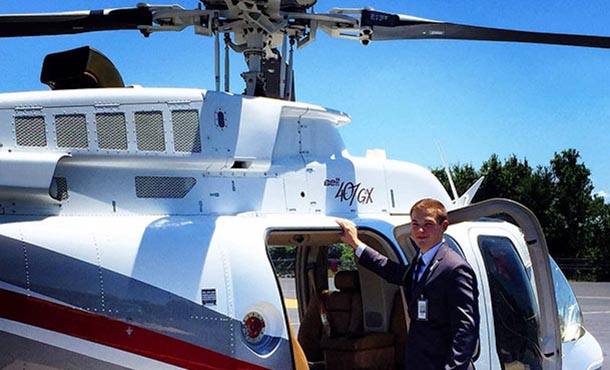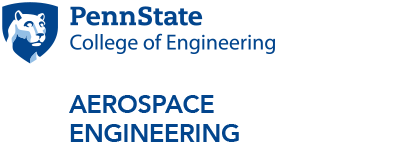
Cornelius boarding a Bell 407GX helicopter for a ride over Dallas, TX. (Photo credit: Connor Nehls, Texas Tech University)
Cornelius appointed a CERI student for spring 2017
1/31/2017
UNIVERSITY PARK, Pa. — Jason Cornelius, a senior in aerospace engineering, has been selected to participate in the Penn State College of Engineering Research Initiative (CERI) program for spring 2017, where he will conduct studies on the computational fluid dynamics of a quadcopter.
“My interest in aerospace started in seventh grade when my mom told me about the gold-coated visor of an astronaut’s helmet; from then on, I was pretty dedicated to pursuing the field,” said Cornelius.
Established in 2014, CERI is designed to provide Penn State undergraduate engineering students with an opportunity to conduct research with faculty at the University Park campus. Cornelius will conduct his quadcopter research while working to complete his graduation thesis under advisers Sven Schmitz, associate professor of aerospace engineering, and Michael Kinzel, research associate, aerospace engineering.
Before enrolling as a first-year student at Penn State, Cornelius had already immersed himself in opportunities to jumpstart his research career. During his final years of high school, he participated twice in the annual Pennsylvania Junior Academy of Science State Competition at Penn State. In his third year of high school, he presented an experiment on electromagnetism, a topic in psychics; then, his final year, he presented research on related rates, a topic in calculus, for which he won the Award of Excellence in Mathematics from Penn State. Judges at the competition included high school teachers, as well as college students and professors.
After he began his collegiate career, Cornelius worked on a publication called Closing the Speed Gap: A Novel Commercial Transonic VTOL Concept and presented the airplane notion, never done before, at the Society of Automotive Engineers International Powered Lift Conference in Hartford, Connecticut. Cornelius is also currently a research assistant for the Department of Aerospace Engineering, and was previously for the Penn State Vertical Lift Research Center of Excellence in 2014.
During summers in 2015 and 2016, Cornelius interned for Bell Helicopter, accumulating knowledge in rotor analysis and flight technology research. While at Bell, he gained experience in finite element analysis, preliminary vehicle design, computational fluid dynamics research, wind tunnel simulations, and helicopter certification.
Spring 2016 granted much success for Cornelius. By taking the semester off at Penn State, he was able to take a co-op at the NASA Ames Research Center. This experience is essentially what sparked Cornelius’s interest in the study of quadcopter acoustics. Cornelius describes his research at NASA Ames as a determined goal to improve the characteristics of its vehicles: “We want to know what impact the noise has on the environment and how it affects people in everyday life. We did a wind tunnel test of those quadcopters, and my job was to characterize the noise and draw some conclusions on how we might be able to mitigate it in the future.”
Cornelius is known for taking the utmost advantage of his time to learn more about his interests within and outside the aerospace field. At NASA Ames, Cornelius spent his free time attending lectures on various scientific disciplines, connecting new knowledge to his own research areas.
“At the end of the day when everyone else was going home, I had no desire to do that. I could either stay here at NASA where I was always learning, or I could go home and sit there,” added Cornelius.
Cornelius spent additional free time checking out wind tunnels and spending time with 10 other interns in the department, who were from all over the world. He claims he “got to interact socially and scientifically with a very diverse group of individuals and look at research from multiple different perspectives.”
Cornelius has been actively engaged at Penn State since his second year. He has served as vice president of the Penn State chapter of the American Helicopter Society (AHS) since 2014, and vice president of the Wind Energy Club since 2015. Additionally, Cornelius was the scholarship chair for his fraternity Phi Kappa Psi from 2014 to 2016, and was a team leader for the American Institute of Aeronautics and Astronautics Design/Build/Fly Competition in 2015.
In 2016, Cornelius received the AHS Vertical Flight Foundation Eugene K. Liberatore Scholarship, the NASA Pennsylvania Space Grant Undergraduate Scholarship, and the Phi Kappa Psi Foundation Jerry Nelson Award. In addition, he received the Department of Aerospace Engineering Lou Borges Scholarship in 2015. Cornelius has also been a Schreyer Honors College representative for the U.S. Naval Academy Leadership Conference.
Cornelius’s plans for the future include attending graduate school, where upon application, he believes his experience as a CERI student will strengthen his candidateship. Cornelius plans on receiving his master’s and doctorate degrees, then later working in the aerospace industry or for the government; however, he hasn’t ruled out working in academia, where he may enjoy becoming an aerospace engineering professor.
“Everything that I have achieved thus far is due to the support and guidance from many friends, family, and mentors,” said Cornelius.



